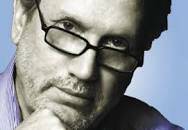I’ve written community columns for The Republic for perhaps 10 years. I’ve appreciated having my say about Bartholomew County and southern Indiana.
As a minister in a nonstandard religious tradition, I’ve also appreciated sharing my liberal religious viewpoint. I hope that’s helped folks remember that all religions are not the same.
But I’ve retired as a minister. I’ve moved out of Bartholomew County. Sometimes it’s just time to move on. So this will be my last column.
I want to thank those who have supported me and sent “warm fuzzies” over the years. I even want to thank those who wrote irate letters of criticism. At least I knew you were paying attention. Better to be “snarked” at than ignored.
My final thought as a community columnist is that as soon as I finish, I’m going to shower and head downtown — to vote.
Early voting is open for Indiana’s May 3 primary election. I intend to have my say.
That’s something we should appreciate as Indiana residents. As imperfect as this — or any — state government is, we do have a good, long time to get in and make our vote count.
Yeah, I know, a single vote is a small thing. It’s easy to dismiss — until you reflect on lands and their people who get no vote at all.
It’s been 40 years since I’ve missed an election. Even at that, I suspect I could have put more effort into voting.
Every time I step into that booth, it seems like I’ll find one or two races I haven’t looked into. I won’t recognize the candidates’ names or know much about the position. I’m just guessing who’ll be best.
I’ve looked at election ballots that seemed like tests I hadn’t studied for.
It’s getting better, though. With the wonders of the Internet, it has become easier to learn about down-ballot races.
Here’s a hint, just in case you don’t already know. Go to indianavoters.in.gov. The site has voter information including registration, where to vote and who’s on the ballot. (You do have to give them your name, birth date and county of residence to get the ballot information.)
To me, the advantage is that once I know who’s on the ballot, I can use the Web to search more hard information and make, I hope, better choices. I can study for that test.
I think this is important. Elections too easily play out on the worst side of human nature. One thing I’ve learned: never believe a word any candidate says while running for office. Got that? Any of them.
Even the best will tell the truth only where it advances their cause.
Sadly, that’s not the candidate’s fault. It’s your fault — and mine. Because the public has proven time and again that we don’t want to hear the truth. We’d much rather hear something comforting. Or at least something that makes us feel good about our anger and prejudices.
Politicians play that for all it’s worth. I don’t think we can blame them. Again, it’s the lesson we teach them every election cycle. We too often reward the sneaky ones and punish the truthful ones.
What was it somebody said? “Democracy is the worst form of government — except for all the others.”
That’s why the more we really learn about candidates’ actions — not just their words — the more we can reward good performance. And punish poor performance. A really informed voter is a bad politician’s worst worry.
To build your piece of the future, do your homework. And then vote.
The Rev. Dennis McCarty is a community columnist and all opinions expressed are those of the writer. He is a recently retired Columbus minister and remains active as minister emeritus and a freelance writer on art, ethics, religion and social issues. He can be reached at [email protected].




